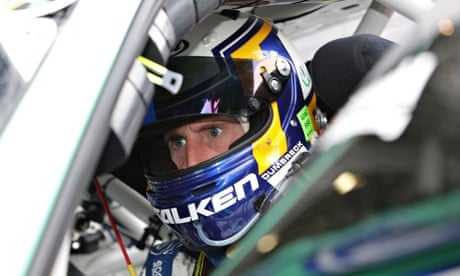For a man whose Mercedes took off into the air and did a quintuple somersault during Le Mans, Peter Dumbreck comes across as remarkably grounded. But then, he says, you have to be, if you want to succeed as a racing car driver. "You need to be able to live for the moment," he says. "Do the best that you can do. If you make it, you make it. And if you don't, you don't. The most important thing is to be pleased with your performance."
Surprisingly, Dumbreck never dreamed of becoming a racing car driver when he was growing up. "My parents had a mushroom farm in Scotland, so I always thought I might become a mushroom farmer one day. My only ambition was to have fun." He started driving when he was nine years old. "I had my own car to drive around the fields with. In fact, I had a series of cars, because I kept wrecking them and smashing them up."
This must have been good practice for go-karting – which Dumbreck took up at 10 years old – because, soon after he got behind the wheel, he started winning races. "Karting teaches you the race craft; 95% of racing car drivers start out by karting. You learn about the basics of kart control, like understeering and oversteering and how to adapt the kart to the race track to make it fast. And, just like in motor racing, you need to be super-competitive to win – I know I am."
A friend spotted Dumbreck's talent and, when he was 17, lent him a better racing kart, which enabled him to win at every kart track in Scotland. "At that point, I thought: 'Actually I am quite good at this, I have the potential to make something of myself here.' But you can't make a career out of karting – I had to start racing cars."
So, at the age of 18, Dumbreck asked his elder brother to pay for him to attend a week-long, £3,000 course at the Jim Russell Racing School so he could get a motor racing licence. "Silverstone is the best racing school now. Up and coming or former racing drivers sit on the corners, watching your lines, watching how you brake. They give you feedback and then you try to improve. After my course – which was where I had my first taste of a racing car – I went on to win every motor race I did that year."
But to keep racing cars, he needed money. "So much in racing is down to the equipment and raising the money you need to race for a season is the biggest challenge for anyone who wants a career in motor racing. It can cost tens of thousands starting out and millions as you get closer to the Formula One dream. The only way you get to drive in a championship for free is if you get recognised in the sport." If a team with less talented – but wealthier – drivers think you'll win the championship the following year, they might be willing to pay for you to join them.
After the racing school championship, Dumbreck ploughed a £30,000 inheritance from his grandparents into funding his next year of racing. "I did the British Formula Vauxhall Junior championship that year and won it. But every penny I had or could get was gone. I was winning, but I didn't know what to do next."
The luckiest break of his career was when the former Formula One racing champion Jackie Stewart picked Dumbreck to drive in his Vauxhall Championship and Formula Three teams for free. "Making the transition from paying money to drive to getting to drive for free in Formula Three is a big step up for any driver. The Formula One teams are looking at you."
Dumbreck continued to win championships but it was only in 1998, five years after he got his racing licence, that he started earning any money from the sport – plus, at the end of the season, he became a factory driver for Mercedes-Benz. They paid him roughly £40,000 for a single race.
In 1999, Dumbreck's car took flight and spectacularly somersaulted mid-race. Miraculously, he walked away uninjured. "Never at any point did I think I'd stop racing. All drivers know the risks. If you're not willing to take them, you're in the wrong place. Sure, the first time you get back in the car after an accident, it feels odd but you simply tell yourself that, logically, there's no reason you would suddenly shunt again."
Before every race, he sits quietly with his eyes closed and visualises driving at top speed on the racetrack. "So much in racing is mental preparation. You do a lap in your head and it should take you the same amount of time as it would doing it for real. Should I ever start to feel uptight or nervous before a race, I breathe deep and all the way out. I tell myself I believe in myself and that I can do the job. And if, during the race, I make a mistake, I don't punish myself too much. I'm only human after all – and I know there's not one driver out there who doesn't make mistakes."
The worst thing about the job is the uncertainty. "You're so dependent on the car. If you're unlucky and get a dog of a car for a year, the results won't reflect your ability and that will affect you the following year."
At 40, he isn't planning on retiring yet. "Most drivers start to wind down around this age but I do know drivers who are still racing on the international stage at 45 or even 50. I will continue racing as long as I can make a living out of it. The day that my team-mates start outpacing me will the day that I stop. Sometimes I do think: 'Ah, it would nice to be home, in the garden, cutting the grass.' But then again, nothing beats the feeling of driving a million-pound car as fast as it can go, and knowing that there's no one who can drive it faster."







Comments (…)
Sign in or create your Guardian account to join the discussion